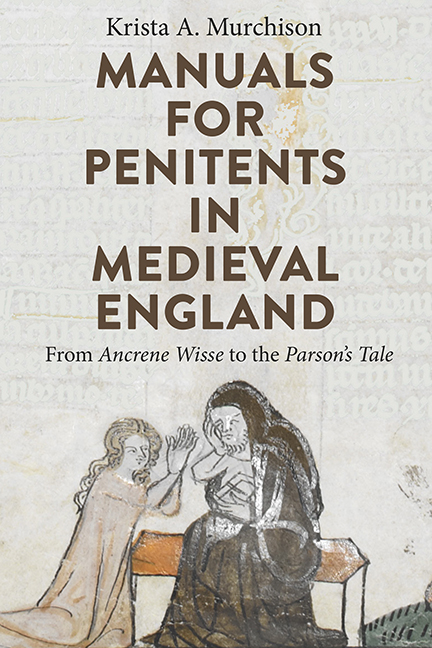Book contents
- Frontmatter
- Contents
- Acknowledgements
- Abbreviations
- Note on the Translation and Treatment of Texts
- A Chronological List of Key Manuals for Penitents and Associated Works
- Introduction: Teaching Sin
- Part I Self-Examination Writing before 1250
- Part II Manuals for Penitents, 1250–1300
- Part III Manuals for Penitents, 1300–1350
- ‘To enden in som vertuous sentence’: Concluding with Chaucer’s Parson
- Bibliography
- Index
4 - ‘De privetez n’i troverét rien’: The Compileison and ‘Anxieties of Outreach’
Published online by Cambridge University Press: 07 October 2022
- Frontmatter
- Contents
- Acknowledgements
- Abbreviations
- Note on the Translation and Treatment of Texts
- A Chronological List of Key Manuals for Penitents and Associated Works
- Introduction: Teaching Sin
- Part I Self-Examination Writing before 1250
- Part II Manuals for Penitents, 1250–1300
- Part III Manuals for Penitents, 1300–1350
- ‘To enden in som vertuous sentence’: Concluding with Chaucer’s Parson
- Bibliography
- Index
Summary
Scholars of medieval history and literature have long recognized that the manuals that were designed to guide confessors through the confessional interrogation express significant unease around sexual activity – and with good cause. Medieval confessors were, as Pierre Payer relates in his study focused on manuals for priests, deeply concerned with the question of how to probe a penitent's conscience without inadvertently introducing new sins, or reminding penitents of old ones. The Summa de casibus poenitentiae (c. 1225), Raymond de Pennaforte's remarkably influential guide for priests, warns confessors about this specific danger: ‘I advise [the confessor] that in his questions he not descend to special circumstances and special sins; for many fall severely after such an interrogation who otherwise would never have dreamt of it’.
Since sexual sins could be committed in private, knowledge of them could be guarded – in theory, at least. While many sins, such as theft, could be learned through social observation, sexual sins were thought to be less easily learned in such a manner, and priests were therefore concerned with keeping them hidden. So significant were concerns over teaching new sexual sins that, according to Payer, written trepidations surrounding confessional interrogations ‘are virtually always about sexual offenses’. Among all sexual offenses, same-sex acts were thought to merit extra secrecy, according to Karma Lochrie. The unease surrounding sexual sin in general and same-sex acts in particular reflects a broader climate of tension surrounding confessional education in the thirteenth century and it is therefore worthy of further examination.
While much has been written about how anxieties surrounding sexual sin are manifested in manuals for confessors, there has been relatively little about how these are manifested in manuals for penitents. This is a shame, since there are striking and significant differences between the two types of writing that make it difficult to generalize about one from the other, and since manuals for penitents tend to reflect, more than manuals for priests, the kinds of confessional education that medieval penitents were receiving and are therefore worthy of study in their own right. The goal of the present chapter, then, is to shed light on the ways in which manuals for penitents approached the idea of teaching about sexual sin and, more broadly, to explore the kinds of tensions that emerged as education about sin increasingly happened at a distance from the established Church.
- Type
- Chapter
- Information
- Manuals for Penitents in Medieval EnglandFrom <i>Ancrene Wisse</i> to the <i>Parson’s Tale</i>, pp. 79 - 98Publisher: Boydell & BrewerPrint publication year: 2021



